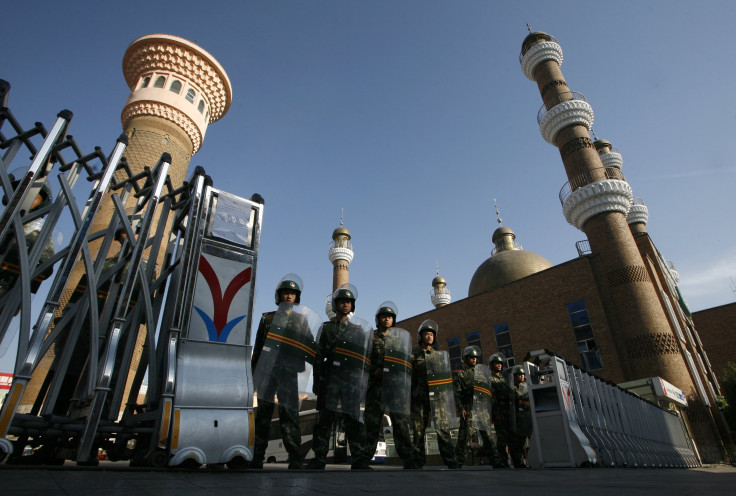Chinese Official Says Some Communist Party Members In China's Xinjiang Region Support Islamic Terrorists

SHANGHAI -- A senior Chinese Communist Party official has accused some party members of supporting or even “participating in terrorist activities” in China’s northwestern region of Xinjiang. Analysts said the rare comments are a sign of tension in the mainly Muslim region, where the government has launched a sometimes controversial crackdown on terrorism and religious extremism, following a series of violent attacks in recent years.
Following this month’s terror attacks in Paris, Beijing has called for more international support for its campaign against Xinjiang terrorists, who it says pose a global threat. However, some human rights groups have warned the crackdown could alienate moderate Muslims in Xinjiang -- and the latest report comes just weeks after the sacking of Xinjiang’s top newspaper editor, apparently for opposing official policy in the region.
State media on Wednesday quoted Xu Hairong, the party’s top discipline inspector for Xinjiang, which borders on Central Asia, as saying that some officials had “made irresponsible remarks" about official policy, and were "double-tongued about significant issues on anti-separatism, ethnic unity and national unification."

Xu did not give details, but the official China Daily quoted a village party chief in Xinjiang's Aksu district as saying that some officials in his village had been removed from their posts for "turning a blind eye to religious extremist activities," and "some villagers who were under the influence of religious extremism later participated in terrorist activities."
The Global Times, meanwhile, said that several village-level Communist Party secretaries had "led villagers in a terrorist attack," though it did not give specifics. It also quoted an anonymous local expert as saying that some grassroots party members “may be inclined to provoke terrorist activities," while some better-educated middle-ranking officials "tend to advocate separatism."
The comments are a reminder of the challenges China faces in Xinjiang. Chinese officials say the region has been affected by Islamist influence from Central Asia over the past two decades. They have also said that some members of Xinjiang's largest ethnic group, the Uighurs, have gone to the Middle East to fight with the Islamic State group, and in some cases have later returned home to launch attacks.
Simmering tension in Xinjiang erupted in 2009, with riots in the regional capital Urumqi in which almost 200 people died. China says Xinjiang separatists have been behind a series of subsequent attacks, including an explosion in Beijing’s Tiananmen Square in 2013, which killed two tourists; an attack on a railway station in Kunming in March last year that killed 31; and an attack on a market in the regional capital Urumqi soon afterwards that killed 35. The authorities have responded with what they have called an “iron fist” campaign against terrorism and religious extremists. In May, officials said they had cracked more than 180 such gangs in the previous 12 months.
China has said it is also seeking to win hearts and minds to reduce the influence of extremist thought. However reports of official bans on beards for students, and bans on Muslim civil servants and students from fasting during Ramadan, have upset some. And some critics have said the life sentence handed last year to Uighur academic Ilham Tohti -- who China accused of promoting separatism but who supporters said was just encouraging debate about policy in the region -- suggested moderate voices were not welcomed.
Signs of dissent came recently with reports that Zhao Xinwei, the editor-in-chief of the region’s top party newspaper, the Xinjiang Daily, had been expelled from the party and put under investigation for making "groundless comments" on national policy. His views, state media said, were “inconsistent with the central and local Party's stand on significant issues, including ethnic separatism, terrorism and religious extremism.” Analysts said the removal of an official from such a key post was highly unusual.
Following this month's attacks in Paris, China called on the international community to drop its “double standards” and acknowledge what it says is a global threat from the East Turkestan Islamic Movement (ETIM), which China says is behind many attacks in Xinjiang. ETIM was designated a terrorist organization by the U.S. government in 2002 however it does not feature on the U.S. State Department's main list of such groups.
In July, China repatriated 100 Uighurs from Thailand, saying they were suspected of terror links, and it has said that 1,200 people were detained seeking to leave the region illegally in the eight months to January this year.
However critics continue to question China’s approach. Following official reports last week on the “annihilation” of 28 alleged terrorists believed to have been responsible for an attack on a coal mine in September, in which at least 16 people were killed, Human Rights Watch this week called for an international investigation into the incident. It said reports of the clash, in which Chinese police said they used a flamethrower to flush the terror suspects out of a cave, before shooting them dead, had led to “skepticism about Beijing’s tactics and goals.”
Analysts have said China is likely to step up its crackdown in Xinjiang following the Paris attacks, the apparent execution of a Chinese national by ISIS in the Middle East, and the deaths of three Chinese railway executives during last week’s attack on a hotel in the Malian capital Bamako. Authorities in Thailand also said Tuesday that they had charged two ethnic Uighurs, one apparently traveling on a Chinese passport, for carrying out August's bomb attack on a temple in Bangkok which killed 20 people, many of them Chinese tourists.
In a sign of continuing tension surrounding China's approach in Xinjiang, a commentary in the Global Times said that government policies in the region had been “misunderstood, either vilely or out of ignorance, by foreign media and international public opinion who contend that the anti-terrorism campaign is a crackdown on Uyghurs." The author said such observers ignored what he called the party’s “continuous focus on ethnic unity.”
© Copyright IBTimes 2024. All rights reserved.












